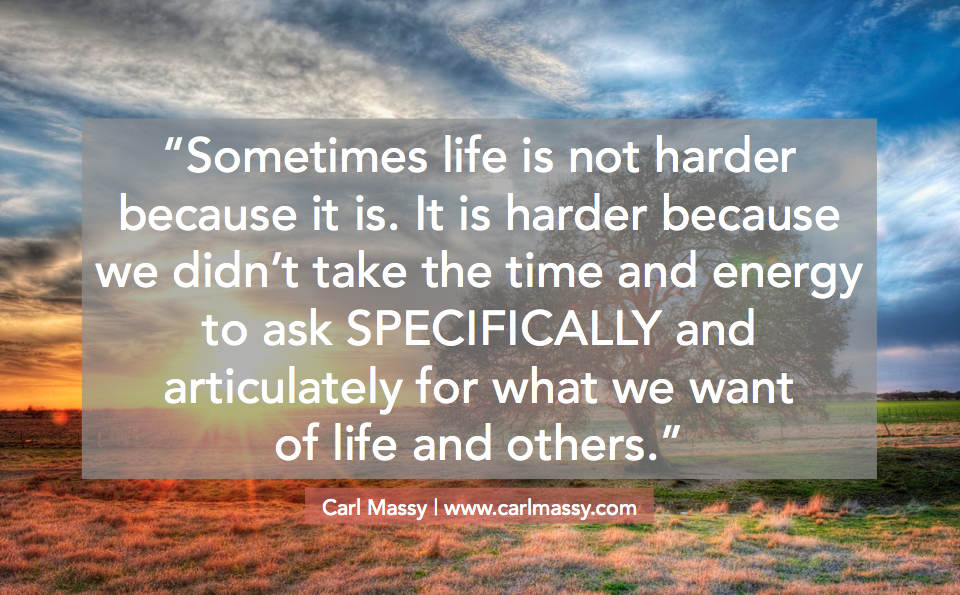
This article and insight is inspired by time spent in the kitchen the other day.
I was in the kitchen the other day with my partner Ferry (who happens to be an awesome cook).
She said something that got me thinking.
And brought us to today’s conversation.
A conversation which includes politicians, fraudsters, hypnotherapists and probably we could put a 4-year old into the mix as well.
The thing that happened with Ferry in the kitchen was this…
It was a very simple comment.
Ferry said: “Can you put some water into the kettle?” (I am pretty sure she did not say please).
As I went about this chore I am thinking exactly how much water is ‘some’?
“Some” is pretty non-descriptive.
It’s a pretty broad generalization.
Do I put in a teaspoon, a tablespoon, a half cup, a full cup, a couple of cups??
I have no clue.
Which got me to thinking (as I found fulfilling this request a little frustrating).
I thought about a different scenario – still in the kitchen – where Ferry says, “Can you put some water in a pot of ingredients brewing on the stove?”.
If I put too much “some” in the pot (because I am a pretty mediocre cook), I might ruin the whole dish and get yelled at.
Not fun for either party.
Which takes me back to the politician, fraudster, hypnotherapist and 4-year old.
I was trying to think if there is any time when ‘generalization’ is actually a good thing?
Politicians generalize so they cannot be held accountable for what they said (they are great at wishy-washy generalizations that can be taken several ways).
A fraudster – like the politician – might keep things a bit grey and fuzzy to confuse you.
The 4-year old does not have the vocabulary, so has to generalize.
And with hypnotherapy we often generalize, because if we get too specific when describing something it can snap a person out of hypnosis, because they had created a completely different picture in their mind.
The cost of Generalizing
Do you like when people don’t meet your expectations?
Does it frustrate you?
Piss you off?
Well, I have some BAD News, based on my work for the last 16-years.
A lot of times, people don’t have their needs met (by an intimate partner, business partner, friends or family), because they were not SPECIFIC in their request.
They chose generalization, over SPECIFICITY.
They used generalization when making a request, and then got annoyed when the other person gave them something different than what they wanted.
When you are specific you are a LOT more likely to get EXACTLY what you want, and how you want it.
Don’t ask for a “hat”, if you want a blue baseball cap.
Don’t ask for “some affection” from your partner when they get home, when what you really want, is a kiss, at least a 10 second hug, and some eye contact.
Don’t ask for “a bit” of help, when the specific help you want is to know how to get clear about the ideal demographics for your product.
Be specific.
Don’t generalize.
When it may be okay to generalize
As I went deeper into this topic, I did contemplate when generalizing might be okay, and even useful.
This is one scenario I came up with (but it also has a caveat):
You are contracting an architect, and don’t want to be too specific, so they have a chance to tap into their creative genius, and come up with something you had not even thought of (or thought possible).
So when it comes to expansive creativity (mostly right-brain stuff), generalization might be useful.
CAVEAT: However, the level of generalization, in the example of the architect, is based on their level of competence, experience and results.
The lower their level of competence and experience (e.g. a new architect), the more specific you need to be.
So again, it is important to understand when to be specific (most of the time), and when you can be more general (unique cases).
In Summary
The VAST MAJORITY of the time it pays to be very SPECIFIC when you ask for something you want.
Don’t ‘hope’ the person is a mind-reader.
Be clear.
When you are too general, or not clear, it is much easier for someone to NOT GIVE YOU what you want.
To not meet your ‘expectations‘.
I would much prefer to take the extra time and energy to be clear and concise when asking for something I want, in order to have the highest probably of getting exactly what I want.
This is another one of those things where people make life (WAY) harder than it needs to be.
They don’t realise being unclear and inarticulate (through bad habit or laziness), when asking for what they want, actually has a much greater impact than they imagine.
Life is not harder because it is – in this case – it is harder because we get lazy or complacent or don’t realise the consequences.
My Parting word
How much unnecessary work, or disappointment, or frustration do we cause in our lives, because we did not take the time to be specific and clear in our communication?
If you know what you want, ask for EXACTLY what you want.
If you don’t know what you want, then figure it out.
And then ask for EXACTLY what you want.
Like I said at the start, I actually think a lot of people don’t have their expectations met, a lot of the time, because they were not clear or specific when asking for something.
Don’t let this be you.
Let you be the person who speaks with authority and clarity about what you want.
I do love the word “SPECIFICITY“.
It is key to making our lives easier.
Therefore, give specificity a whirl, and then let me know how it works out for you.
On that note, flex your clear communications muscles today, and notice how they positively impact the rest of your week.
Take care,
Carl
PS: Have you read or listened to this book yet? 18 Ways We Make Life WAY Harder Than It Needs To Be

